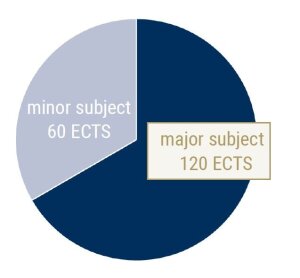- Faculty of Social and Behavioral Sciences
Cultural Anthropology/Cultural History
- Degree
- Bachelor of Arts
- Supplement to degree
- major in a multi-subject bachelor’s programme
- Admission restriction
- without admission restriction (without NC)
- Duration
- 6 Semesters
- Credits/ECTS
- 120
- Teaching language
- German
- Tuition fee
- None
- Semester contribution
- € 305,05
- Start of studies
- Winter semester
- Part-time possible
- Yes
- Institutions
- Faculty of Arts
- Institute of Studies in Arts and Cultur (section: Cultural Anthropology/Cultural History)
Programme content
Subject consists of the sub-subjects Cultural Anthropology and Cultural History.
Cultural Anthropology is a cultural studies discipline which, in close connection with neighbouring subjects such as History, Linguistics, Literature, Art History, Ethnology and Religious Studies, focuses on people's ways of life, primarily in the subject area)|field of their own culture. Cultural anthropology is an empirical subject with primarily qualitative approaches (soft methods) and hermeneutic-interpretative working methods. The focus of interest is on popular and everyday culture in its oral and written traditions, its images, symbols and signs, in particular the categories of society, History and sex|gender. One focus is on visual anthropology. This analyses communication in everyday life and reveals the production and use of media using qualitative, ethnographic methods. Film, photography and other media formats are used to collect, analyse and popularise information.
Cultural history deals with the relationships between culture and society in Europe and global modernity. It starts historically with individual social actors, groups or societies and is interested in their cultural forms, horizons of interpretation, values, experiences and perceptions, practices - and their representations. Cultural history gains its insights from sources: In addition to texts (such as books, newspapers, journals, correspondence, diaries), material culture is also integrated into the source corpus. This includes media (such as posters, photos, radio reports, films, television reports, blog entries) as well as a wide variety of objects, from everyday to scientific (e.g. a camping TV, clothing, an X-ray machine). Jena Cultural History offers course|classes on comparative European cultural history, cultural theory, history of science, history of institutions and media analysis.
Structure
Multi-subject bachelor’s programme
Picture: Sophie BartholomeThe Bachelor's degree is the first professional qualification. The standard period of study|regular programme length is six semesters in total, during which various forms of courses (e.g. seminars, lectures or tutorials) are offered for the individual modules.
A multi-subject Bachelor's degree consists of a major subject with 120 credit points (abbreviation: LP / 1 LP = 30 hours of attendance, preparation and follow-up work|follow-up activity, learning and assessed coursework and examinations) and a supplementary subject with 60 LP.
Why study in Jena?
- Unique combination in German: cultural studies of an empirical nature (focus on German culture, local and regional cultures) focussing on the world of life and everyday life in the present and History, combined with cultural studies of a historical nature (focus on European cultural history) focussing on the world of life, media and institutions of the past.
- Unlimited possibilities: Experience internationality! The University attracts students and academics from all over the world with its attractive conditions and characterises Jena as a future-oriented and cosmopolitan city - these are ideal requirements for prospective international students [mp4, 56 mb]mp4, 57 mb · de.
- Adventures abroad: You can easily fulfil your dream of a semester abroad de. Our university has a worldwide network of partner universities.
What can you do after your studies?
Career opportunities:
The degree programme lays a broad foundation for career orientations in the subject areas of cultural work, museums, journalism and science. In addition to subject-specific academic skills, as a graduate you will have the communicative skills to present science to the public (for exhibitions, presentations, lectures, articles of an expository and promotional nature as well as scientific-systematic presentations).
Downloads and links for the degree programme
What are we looking for in prospective students?
- Basic knowledge of History
- Interest in understanding complex political, social and cultural problems of the past
- Curiosity about cultural processes in the present
Admission requirements
-
University entrance qualification
A university entrance qualification, such as a general secondary school leaving certificate, is required for admission onto the study programme.
More information on university entrance qualifications can be found here.
Contacts
Zwätzengasse 3
07743 Jena
Google Maps site planExternal link
Zwätzengasse 3
07743 Jena
Google Maps site planExternal link
Bachstraße 18k
07743 Jena
Telephone hours:
Mondays and Fridays (9:00 – 11:00)
Wednesdays (13:00 – 15:00)
The ASPA is primarily responsible for students in the Faculty of Social and Behavioural Sciences, the Faculty of Arts and Humanities, and the Faculty of Theology.
Postal address:
Akademisches Studien- und Prüfungsamt
Fürstengraben 1
07743 Jena
Fürstengraben 18
07743 Jena
Google Maps site planExternal link
University Main Building / SSZ
Fürstengraben 1
07743 Jena
Google Maps site planExternal link
Office hours:
We offer consultations in person, by telephone, and via Zoom. You can make an appointment by calling us on +49 3641 9-411111 (Mondays to Fridays from 9:00 to 11:00) or outside these office hours on +49 3641 9-411200. You can also use our remote help desk.
Consultation hours:
Mondays, Tuesdays, Thursdays and Fridays (9:00 to 12:20), Tuesdays (14:00 to 18:00), and Wednesdays and Thursdays (14:00 to 16:00).
Video chat: To the video chat – Zoom Videochat ZeitenMondays to Fridays (12:30 to 13:00) Password ZSB2020 Data protection informationpdf, 101 kb
University Main Building, Room E065
Fürstengraben 1
07743 Jena
Google Maps site planExternal link
Opening hours:
Information Desk (UHG; Room E0.65)
Mondays (10:00 – 12:00)
Tuesdays (13:00 – 15:00)
Wednesdays (10:00 – 12:00)
Thursdays (13:00 – 15:00)
Fridays (10:00 – 12:00)
You can also use our remote help desk at
www.uni-jena.de/service-ssz
or send us your enquiries by post.
Telephone hours:
Mondays to Fridays
(9:00 – 11:00)
Postal address:
Friedrich-Schiller-Universität Jena
Studierenden-Service-Zentrum
07737 Jena
University Main Building
Fürstengraben 1
07743 Jena
Google Maps site planExternal link
